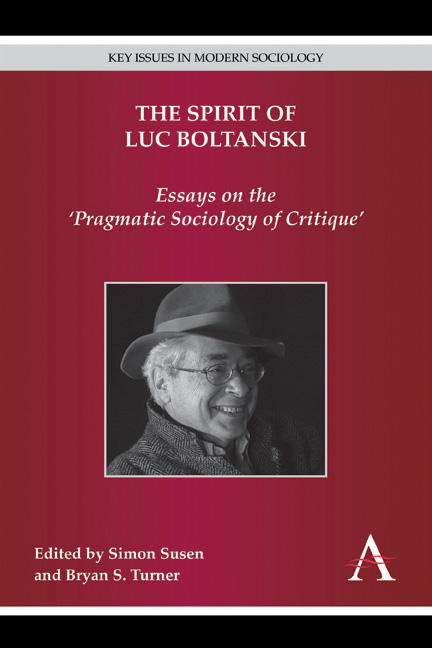Book contents
- Frontmatter
- CONTENTS
- List of Contributors
- Preface
- Part I Introductory Remarks
- Part II Luc Boltanski and (Post-) Classical Sociology
- Part III Luc Boltanski and Pragmatism
- Part IV Luc Boltanski and Critique
- Part V Luc Boltanski and Critical Sociology
- Part VI Luc Boltanski and Political Sociology
- Part VII Luc Boltanski and Contemporary Issues
- Part VIII Luc Boltanski in Conversation
- Part IX Luc Boltanski and His Critics
- Luc Boltanski and His Critics: An Afterword
- Index of Names
- Index of Subjects
Luc Boltanski and His Critics: An Afterword
from Part IX - Luc Boltanski and His Critics
Published online by Cambridge University Press: 05 December 2014
- Frontmatter
- CONTENTS
- List of Contributors
- Preface
- Part I Introductory Remarks
- Part II Luc Boltanski and (Post-) Classical Sociology
- Part III Luc Boltanski and Pragmatism
- Part IV Luc Boltanski and Critique
- Part V Luc Boltanski and Critical Sociology
- Part VI Luc Boltanski and Political Sociology
- Part VII Luc Boltanski and Contemporary Issues
- Part VIII Luc Boltanski in Conversation
- Part IX Luc Boltanski and His Critics
- Luc Boltanski and His Critics: An Afterword
- Index of Names
- Index of Subjects
Summary
This Afterword provides a summary of the key themes, issues, and controversies covered in each of the preceding chapters.
Luc Boltanski and (Post-) Classical Sociology
Bridget Fowler
Readers who are not, or barely, conversant with Luc Boltanski's key contributions to the contemporary social sciences will appreciate the clarity with which Bridget Fowler provides a valuable, wide-ranging, and critical introduction to his work in the opening chapter of this volume. As indicated in the title of her piece, ‘Figures of Descent from Classical Sociological Theory: Luc Boltanski’, Fowler examines Boltanski's writings in relation to classical sociological thought. In so doing, she suggests that his critical engagement with mechanisms of ‘domination’ is firmly situated ‘in the Marxist and Weberian traditions’, whilst his interest in ‘moral and symbolic representations’ is indicative of the profound influence of ‘the Durkheimian tradition’ on his intellectual development. Full of admiration, Fowler insists that Boltanski ‘has made an enduring contribution to sociology’. More specifically, she claims that ‘perhaps the main virtue of Boltanski's sociology has been to enrich our understanding of subjective meanings at moments of indeterminacy’, notably by exploring ordinary actors' capacity to cope with the ontological uncertainty that appears to be built into the construction of social reality.
Seeking to make sense of Boltanski's intellectual trajectory, Fowler proposes to distinguish three phases that are particularly relevant to the development of ever-more fine-grained conceptual tools in his writings:
I. The initial period refers to Boltanski's outputs published in the mid-1970s and early 1980s. During this stage, he occasionally co-authored articles with his ‘intellectual father’, Pierre Bourdieu. According to Fowler, the writings that Boltanski produced during this phase bear the hallmarks of ‘a critical advocate of Bourdieusian theory’ – that is, of someone sharing the basic presuppositions that undergird Bourdieu's ‘constructivist realism’.
II. The middle period is based on the influential studies that Boltanski published in the 1990s. In these works, he focused on the sociological significance of the emergence of multiple social universes (cités), conceived of as different regimes of action and justification.
- Type
- Chapter
- Information
- The Spirit of Luc BoltanskiEssays on the 'Pragmatic Sociology of Critique', pp. 613 - 802Publisher: Anthem PressPrint publication year: 2014



